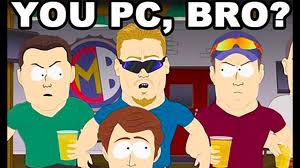I see that I need to supply a caveat to yesterday’s post. As expressed in no uncertain terms by the first commenter, a lot of people don’t like Peterson. The comment was “Ugh, seriously?” There’s more vituperous criticism further down, of me (for appreciating Peterson) as well as Peterson himself. When I scan down the first 15 comments or so, I see huge polarization. Some people love him; others hate him. That’s a pretty accurate reflection of the Peterson phenomenon in the larger world.
(Addendum: my review just got published. You can find it here.)
I mentioned this political maelstrom in yesterday’s post, without getting deeply into it. I guess I should go a bit further and summarize the issues as I see them. Some of Peterson’s arguments offend, and they particularly offend people on the (perhaps far) left. For example, he explains dominance  hierarchies as a product of our evolution rather than the construction of an oppressive (white, male) culture. He distinguishes sex differences, which are (he claims and I certainly agree) rooted in biology and evolution, from the social construction of gender. He analyzes the personality traits associated with women and men and argues that the asymmetrical distribution of these traits (something you may have studied in Psych 101) has much to do with the gender pay gap — which is therefore not simply a result of sexism. He certainly doesn’t deny the existence of sexism, or oppression by dominant cultural forces, or the rights of transgender people. Not at all. Yet his infusion of statistically validated facts and an evolutionary perspective into the ideological battles raging (especially in the universities) about diversity, gender, social justice and so forth has alienated and angered many on the left.
hierarchies as a product of our evolution rather than the construction of an oppressive (white, male) culture. He distinguishes sex differences, which are (he claims and I certainly agree) rooted in biology and evolution, from the social construction of gender. He analyzes the personality traits associated with women and men and argues that the asymmetrical distribution of these traits (something you may have studied in Psych 101) has much to do with the gender pay gap — which is therefore not simply a result of sexism. He certainly doesn’t deny the existence of sexism, or oppression by dominant cultural forces, or the rights of transgender people. Not at all. Yet his infusion of statistically validated facts and an evolutionary perspective into the ideological battles raging (especially in the universities) about diversity, gender, social justice and so forth has alienated and angered many on the left.
The ideas I’ve just outlined don’t seem so radical to me. I’ve heard that Peterson says more controversial things about marriage and women’s roles, etc, though I haven’t read them myself. The famous pronoun war (google it) can certainly be judged from divergent viewpoints. I suppose Peterson really is a conservative in some respects. He’s definitely not trying to be politically correct. In fact a foundational plank of his philosophy is that people should say what they believe to be true, especially if they are voicing unpopular views. He  staunchly elevates free speech over “sensitivity” to the feelings of others. In a response to one interviewer (and this is worth viewing if you want more insight into his politics) he said he greatly admires Rosa Parks for standing up for herself against the systemic racism of her day.
staunchly elevates free speech over “sensitivity” to the feelings of others. In a response to one interviewer (and this is worth viewing if you want more insight into his politics) he said he greatly admires Rosa Parks for standing up for herself against the systemic racism of her day.
 As a result of his stated positions, Peterson has been mobbed by what he terms “social justice warriors”– people who espouse extreme leftist views. There’s no doubt that he disagrees with many of their views and he’s angry at the insulting nature of their attacks on him. He’s literally been shouted down on more than a few campuses. Does that make him a right-winger? Not yet. The view of Peterson as a (perhaps extreme) right-winger comes from the next act in this play. People
As a result of his stated positions, Peterson has been mobbed by what he terms “social justice warriors”– people who espouse extreme leftist views. There’s no doubt that he disagrees with many of their views and he’s angry at the insulting nature of their attacks on him. He’s literally been shouted down on more than a few campuses. Does that make him a right-winger? Not yet. The view of Peterson as a (perhaps extreme) right-winger comes from the next act in this play. People  who really do identify with the right, including the far right, started to proclaim their undying loyalty to Peterson, mainly because the far left seems to hate him so much. In my view, the equation is simple. If my enemy hates you then you must be my friend. Does that make him a right-winger?
who really do identify with the right, including the far right, started to proclaim their undying loyalty to Peterson, mainly because the far left seems to hate him so much. In my view, the equation is simple. If my enemy hates you then you must be my friend. Does that make him a right-winger?
This is just a superficial and no-doubt inadequate overview of the social currents surrounding the “most popular intellectual in the world” (something I read recently). But the thing about Peterson is that he’s not a political animal. He says what he thinks to be true, and he really doesn’t care  too much about the fallout. I personally don’t think he enjoys being in the centre of this altercation one bit. He’s said many times in public that he’d rather people listen to, and argue with, the content of his arguments than slot him into a political ideology.
too much about the fallout. I personally don’t think he enjoys being in the centre of this altercation one bit. He’s said many times in public that he’d rather people listen to, and argue with, the content of his arguments than slot him into a political ideology.
Anyway, I’m certainly no political commentator, and my understanding of the political face-off around Peterson comes from browsing articles and videos on the Internet. My own political sentiments are firmly on the left, as any regular reader of my blog  surely knows. (When Trump got elected, I wrote a post entitled “Oh Shit.” I was depressed for weeks and made no secret of it.) But that doesn’t mean I have nothing to discuss with people who see things differently. And more to the point, this blog isn’t about politics. It’s about experiential, social, psychological, and neurobiological approaches to understanding addiction. I’d be glad to chat with anyone out there about the the political eruptions surrounding Peterson’s public persona. I’m sure I can learn something. Maybe over a coffee if I’m ever in your part of the world.
surely knows. (When Trump got elected, I wrote a post entitled “Oh Shit.” I was depressed for weeks and made no secret of it.) But that doesn’t mean I have nothing to discuss with people who see things differently. And more to the point, this blog isn’t about politics. It’s about experiential, social, psychological, and neurobiological approaches to understanding addiction. I’d be glad to chat with anyone out there about the the political eruptions surrounding Peterson’s public persona. I’m sure I can learn something. Maybe over a coffee if I’m ever in your part of the world.
 But I think it would be a shame to ward off Peterson’s ideas as if he were some sort of vampire, simply because of the political accusations flying back and forth. I don’t agree with everything Peterson says. In my review, soon to come out, I firmly criticize him for cherry-picking scientific factoids to support dubious assumptions and for a style of argument which violates the standards of scientific discourse — namely basing one’s authority on intuitions rather than methodical arguments grounded in data. Yet some of his ideas strike me as valid, powerful, refreshing, constructive, and of particular utility for enhancing personal growth. Whether you consider yourself to be on the right or on the left, it seems there’s much of value here, and I hope you won’t throw the baby out with the bathwater.
But I think it would be a shame to ward off Peterson’s ideas as if he were some sort of vampire, simply because of the political accusations flying back and forth. I don’t agree with everything Peterson says. In my review, soon to come out, I firmly criticize him for cherry-picking scientific factoids to support dubious assumptions and for a style of argument which violates the standards of scientific discourse — namely basing one’s authority on intuitions rather than methodical arguments grounded in data. Yet some of his ideas strike me as valid, powerful, refreshing, constructive, and of particular utility for enhancing personal growth. Whether you consider yourself to be on the right or on the left, it seems there’s much of value here, and I hope you won’t throw the baby out with the bathwater.

Leave a Reply to jeremy thompson Cancel reply